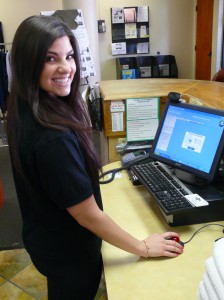
Club management software (CMS) is often the lifeblood, and also the biggest cause of headaches to club owners. When many club owners take on the responsibility of managing a club, often operators don’t understand all of the ins-and-outs of the club’s software and how it can be properly utilized to benefit the club and its members.
What Club Management Software Can Do For You
Mike Minton, the owner of Minton Sports Complex in Texarkana, Texas recently celebrated his 25th year in business, but didn’t start using CMS until three years ago. After some research, Minton partnered with ABC Financial, due to their software’s ability to track facets of his business that were important to Minton — such as point of sale and personal training revenue. However, the biggest asset CMS gave to Minton was customer service. “We need to be able to talk to someone when we need help, such as with glitches or errors — ABC gives us the best customer support. When you call you get someone promptly.”
Having a partnership with your software company is the top priority when handling billing and collections. The company is there to assist you in any way possible, to the fullest extent of its ability. “As our business has grown, having a partner in a club management software company has really helped,” said Minton.
Partnering with a CMS company can allow you to conduct membership billing online, track memberships and cancellations, check members in, help with minimizing faulty electronic fund transfers (EFTs) and more. “If you’re not using club management software to manage your club, you’re in the dark ages,” said Carole Oat, the national sales manager of Twin Oaks.
It can also help with retention, and allow for easier communication with members. “I think where some clubs miss out on the most is member retention. It’s cheaper to retain a member than it is to sell a new membership,” said Oat. Most software allows you to keep members up to date through e-mail updates, text messages and e-mail blasts. “You can manage the member and your prospect,” through these avenues, said Oat.
Lorinda Drake, the business office manager for The Belmont Athletic Club, has had a similar experience with Twin Oaks. “[Twin Oaks] gives us the ability, if there is an issue, to contact the member directly through the software,” she said. “If we have a return or outdated credit card, members can be contacted by e-mail directly. Members typically respond quicker that way. Sometimes members can get defensive when you call them by phone.
“Twin Oaks enabled us to have our members access their accounts via the website, where they can see charges, pay their accounts and update their credit card and billing information,” Drake continued.
“The quicker you resolve an issue with your members the happier they’re going to be and the longer they’re going to stay with your club,” explained Gina Konow-Plante, the office manager at World Gym in Norwich, Conn., another Twin Oaks client.
Easier communication with members and prospects means a greater probability of issues being solved — and you and your members being happier.
Common Mistakes
“The most common mistakes that clubs make concerning billing and collections issues would have to be incorrect information and out of date information,” said Bruce Kennedy, the director of sales for Affiliated Acceptance. “Clubs should look for a full-service billing and collections provider that has sufficient staff to support these issues and any other issues in a prompt and professional manner. Club owners try to do these types of things in-house, far past the growth of their membership, resulting in hours of phone calls, paperwork and handling billing and collections nightmares.”
“One of the keys to minimizing faulty EFTs is to attach a voided check to each new customer agreement,” explained Chris Schuk, the owner of Ultra Body Fitness. “We have a verification process when the agreement is sent to our corporate headquarters to double-check that the EFT information was entered into the software correctly. The software gives us critical updates on delinquencies that can be accessed daily. This, in turn, allows us to contact the customers immediately to clear up returned payments.”
However, Minton advised that you shouldn’t give up all responsibility of managing billing and collections to the software company. “Even when you use a reputable company it doesn’t mean you lose responsibility,” said Minton. “You must manage your receivables,” he stressed. Every month, look at your payments due line. “Make sure that if you signed 100 new memberships you’re getting 100 new payments.”
According to Minton, club owners should keep in mind that the fitness industry runs on receivables, something they sometimes forget. “In regards to billing, eight out of 10 of the club operators that call me for advice I tell, ‘this is a receivables nature business.’ This presents some challenges that a cash business does not. You have to manage your receivables. We use ABC Financial but we still check for accuracy.”
As a result, the bottom line is — pay attention. “Make sure you’re constantly getting the update numbers from your clients. You have to be active on that,” said Minton. Many owners put all responsibility of accuracy on software. If you’re paying attention, you see right away when mistakes are made, or if payments aren’t going through, and you can take action. If a member gets behind three months or more on payments, it can be hard for them to get caught up. “The sooner you address that issue, the better it is for your member and the better it is for you,” said Minton.
What Does it Mean to Be PCI Compliant?
Another aspect of CMS that can be confusing to club owners is the lingo. For example, what exactly does it mean to be Payment Card Industry (PCI) compliant?
According to Kennedy, being PCI is a set of information security requirements issued by the Payment Card Industry Security Council, through Payment Card Industry Data Security Standards. PCI is, “A joint effort by Visa, MasterCard, American Express, Discover and JCB to force merchants, service providers and acquirers to take certain measures to reduce the risk of payment card fraud by protecting all aspects of their businesses that pertain to the handling of cardholder data. Specifically, merchants, service providers and acquirers are required to implement technologies that maximize security of cardholder data and institute business practices and processes that protect cardholder data,” Kennedy explained.
“PCI means that you’ve taken all the necessary steps to be ‘payment and industry compliant,’” explained Oat. “Part of that is working through a company that is PCI.” When you work with a PCI company, all of the data is encrypted — meaning information isn’t easily accessible. This protects the members’ information, she said.
Using CMS, versus old filing systems, will be a great step towards ensuring your members’ information is safe. “A back office filled with paperwork containing sensitive personal information and billing information is a possible PCI situation waiting to happen,” said Steve Ayers, the chief revenue officer for ABC Financial.
You can find out whether a CMS company is PCI compliant by visiting VISA.com to view the list of companies who meet this standard. If you aren’t compliant, you may be subjected to additional fees, said Oat. “Verify if you’re PCI compliant — it’s worthwhile.”
Overall, CMS can make managing your club easier and more efficient. However, “Be proactive in learning the software and how it can work best for you,” said Schuk. “There are so many great reports at your fingertips, but it can be a little overwhelming, and sometimes you have a hard time finding the one that meets your needs. Try and build a relationship with the software team and let them know exactly what you need to run your business. The information is usually there, and they can either point you in the right direction or help create what you are wanting.”
By Rachel Zabonick
Stay ahead in the fitness industry with exclusive updates!
Rachel Zabonick-Chonko is the editor-in-chief of Club Solutions Magazine. She can be reached at rachel@peakemedia.com.












